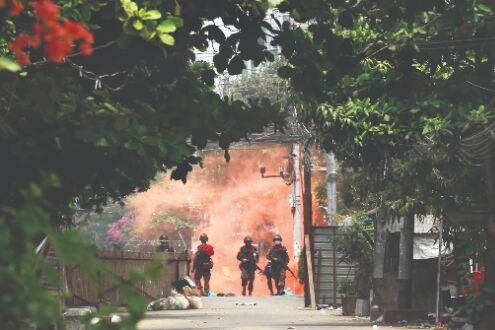Anti-coup protests: Death toll tops 500 in Myanmar

Yangon: The death toll in Myanmar's military crackdown on anti-coup demonstrators has reached 510, the Assistance Association for Political Prisoners (AAPP) confirmed on Tuesday, warning that the true toll might be higher.
The AAPP said at least eight civilians were killed in Myanmar's biggest city Yangon on Monday. The total number of deaths the watchdog recorded on Monday was 14, DW reported.
International pressure is mounting on Myanmar's junta for using force against protesters since the military ousted the elected leader Aung San Suu Kyi on February 1.
On Monday, the United States suspended a trade deal with Myanmar, demanding the restoration of a democratic government.
The US, Canada, Britain and the European Union had imposed sanctions on Myanmar's military generals. International organizations, including the United Nations, have continuously condemned the crackdown.
Garbage covered the streets of Yangon on Tuesday as activists found a new way to protest the coup.
Images circulated on Twitter showed piles of garbage at main road intersections after protesters asked residents to leave their rubbish as a form of civil disobedience.
According to local media, authorities warned that they would take action against those who threw out garbage in Kyeemyindaing district, western Yangon.
Earlier in March, Myanmar's junta imposed martial law in two districts in Yangon to gain more power amid increasing protests in the city.
Armed groups threaten the military
Three of Myanmar's armed ethnic rebel groups issued a joint statement threatening the military with retaliation.
The Ta'ang National Liberation Army, the Myanmar Nationalities Democratic Alliance Army and the Arakan Army (AA) said if the junta did not stop the bloodshed, they would "cooperate with the protesters and fight back."
The statement came after the General Strike Committee of Nationalities (GSCN), one of the leading groups organizing demonstrations, called for ethnic minority forces to help protesters.
Since Myanmar's independence from Britain in 1948, armed rebel groups have fought the central government for decades for more autonomy.
Meanwhile, Thailand's prime minister denied Tuesday that his country's security forces have sent villagers back to Myanmar who fled from military airstrikes and said his government is ready to shelter anyone who is escaping fighting.
His comments came a day after humanitarian groups said the Thai military had begun sending back some of the thousands of people who have fled a series of airstrikes by Myanmar's military. There is no influx of refugees yet. We asked those who crossed to Thailand if they have any problem in their area. When they say no problem, we just asked them to return to their land first. We asked, we did not use any force, Prime Minister Prayuth Chan-ocha told reporters.
The weekend strikes, which sent ethnic Karen people to seek safety in Thailand, were another escalation in the violent crackdown by Myanmar's junta on protests against its February 1 takeover.
At least 510 protesters have been killed since the coup, according to Myanmar's Assistance Association for Political Prisoners, which says the actual toll is likely much higher. It says 2,574 people have been detained. Protests continued Tuesday despite the deaths of more than 100 people on Saturday alone.
The coup that ousted the government of Aung San Suu Kyi reversed the country's progress toward democracy since her National League for Democracy party won elections in 2015 after five decades of military rule. At Thailand's Mae Sam Laep village along the Salween River, which forms the border with Myanmar, paramilitary Thai Rangers on Tuesday twice waved off a boat that had come from the other side carrying seven people, including one lying flat and another with a bandage on his head. But ambulances soon arrived on the Thai side and it landed anyway.



